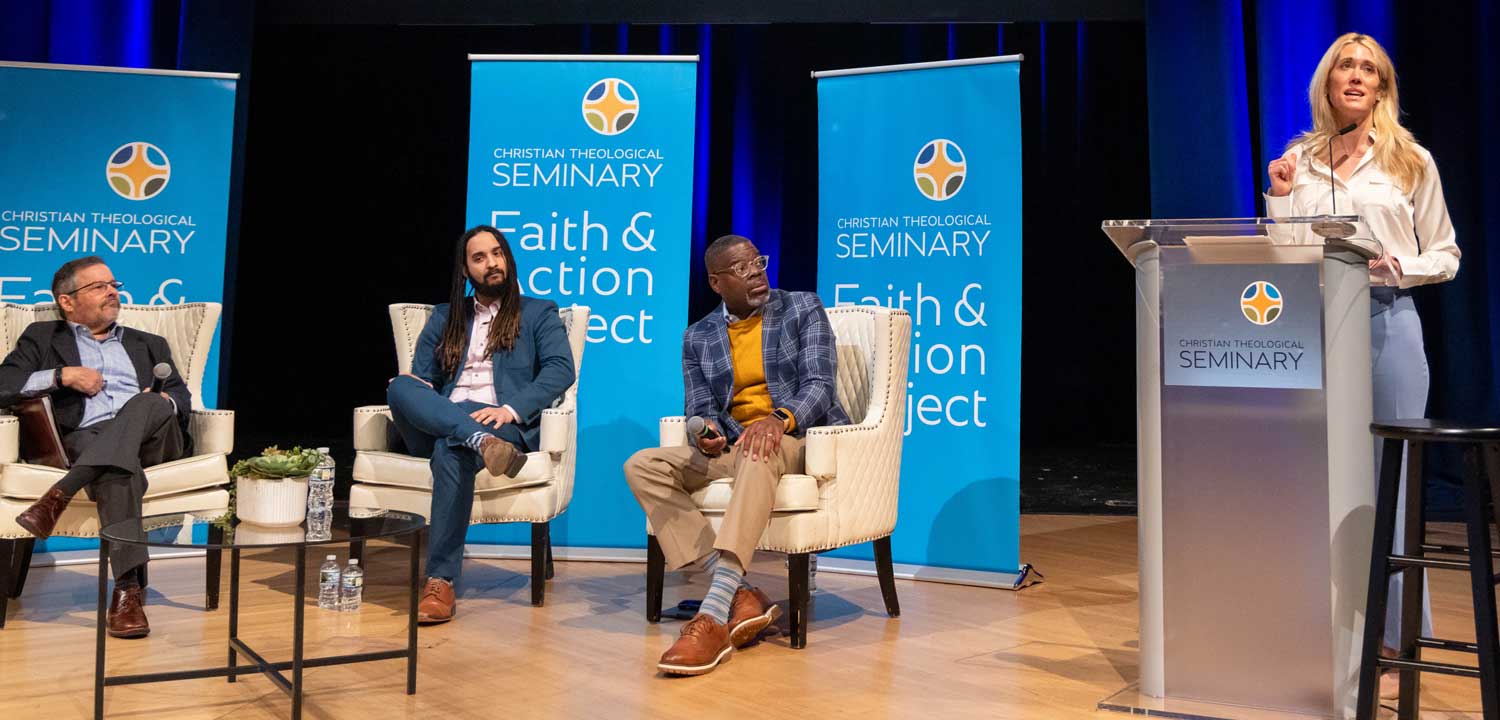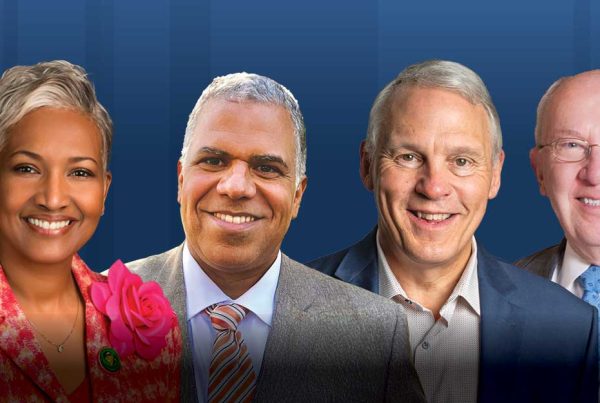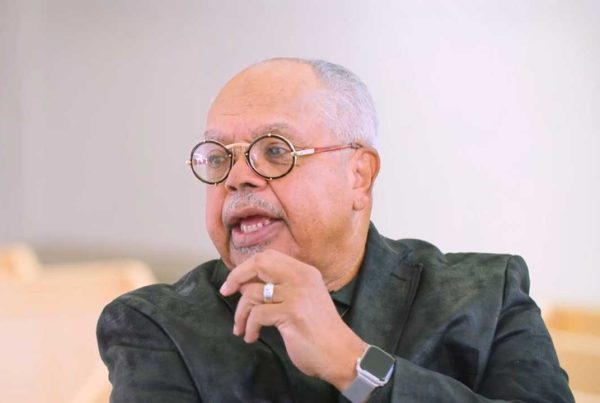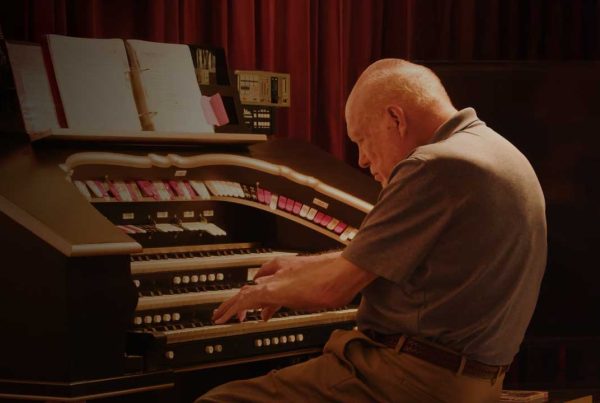Lessons Learned on Housing and Poverty at the 2025 Spring Conference
With a somber yet powerful voice, best-selling author and poverty expert David Ambroz captivated the 400 faith and community leaders at the 2025 Faith & Action Spring Conference on March 11 by reading from his poignant memoir, A Place Called Home.
Sharing his heartbreaking journey as a child living on the streets with a mother struggling with mental illness, Ambroz provided insights only available from those with lived experience of homelessness, foster care, hunger, abuse, and violence. As he read, he emphasized, “… our homelessness stretches on forever, in all directions, studded with temporary refuges …”
His address is timely for Central Indiana. Inextricably tied to poverty, housing insecurity in Indianapolis is worsening. In 2024, Indianapolis saw an 18% increase in homelessness over 2023, with the sharpest increase seen among families. For these reasons, this year’s Spring Conference focused on housing.
CTS President Dr. David M. Mellott opened the day expressing concern about policy changes that undermine infrastructures of care and support, particularly for the socially vulnerable. As an institution founded 100 years ago to provide theological education to all students on an equal basis, CTS views the Faith & Action Project and its work to mitigate poverty as a reflection of CTS’ core mission. “CTS is not wavering from our values or our commitments in this hour,” he said. “In fact, now is the time to embody them even more.”
Rev. Dr. Nicole McDonald of Central Christian Church led a moderated conversation with Ambroz, diving deeper into solutions for poverty and homelessness. Grace Findley, Chief Development and Partnerships Officer at The Indianapolis Foundation, provided key data that underscored the urgent need for change. To bring the conversation full circle and put our faith into action, clergy insights were shared by Dr. Winterbourne Harrison-Jones of Witherspoon Presbyterian Church and Rabbi Brett Krichiver of Indianapolis Hebrew Congregation.
Throughout the Spring Conference, speakers made the case for fighting for affordable housing in Indianapolis, with many of them expressing a shared mantra: “If you don’t want affordable housing in your backyard, then expect homelessness in your front yard.”
Here are some key lessons from the conference:
- Look up. Too often, we ignore people who are unhoused. We walk by them, looking down at our phones or looking away. “They don’t want to be invisible,” Ambroz said. “Nothing we do will make them feel any worse about themselves than they already do. So look up and look them in the eyes.”
- Combat stigma. It’s essential to stop dehumanizing others. In a time when misconceptions and prejudices cloud perceptions of those living on the streets, we must recognize each person’s inherent dignity and unique story. Melody ‘Mel’ Johnson, a local musician, artist, and former Outreach Indy client, shared her powerful poem, ‘Because of Outreach,’ where she described how the support and friendship she received there made her feel valued and seen.
- Start with the belief that Housing is a Human Right. All panelists—including Matt Impink from the Marion County Prosecutor’s Office, Kenya Anderson of Indiana Youth Group (IYG), Bianca Phillips of the Indianapolis Urban League, Ben Tapper with the City of Indianapolis, Hale Crumley of Prosperity Indiana, Lydia Watson of UWCI, and Pastor Reginald Fletcher of Living Word Baptist Church—unanimously agreed that their work is rooted in the conviction that everyone deserves access to safe, habitable, and affordable housing. This fundamental belief shapes their approach to addressing housing insecurity and drives their collective efforts for change.
- Organize and get political. “We need policy changes to make a real difference,” Ambroz said. “Democracy requires participation—schedule time for civic engagement.” Rabbi Dr. Aaron Spiegel of the Greater Indianapolis Multifaith Alliance added, “Organizing isn’t yelling. It’s strategic and thoughtful and based on relationships. We need more people to get out of their comfort zones and get engaged in all levels of the political process.”
- Find a way forward. Once committed to civic engagement, prioritize building relationships and seeking collaborators. Avoid duplicating efforts by sharing successful ideas and examples to connect and amplify your work, reaching more vulnerable individuals. One of Ambroz’s key proposals was creating dorms at community colleges for youth transitioning out of foster care. Since housing is the primary barrier to their success, this would help break the cycle from foster care to homelessness. Pastor Darrell Brooks of the Black Church Coalition emphasized, ‘It doesn’t matter the size of your church; get involved and take action.” Rev. Dr. Harrison-Jones said, “It’s time to pray with our feet.”
- Build up “muscles of community.” Rev. Anthony Murdock of Eastern Star’s ROCK Initiative, which has invested $10 million in affordable housing on its eastside campus, shared how the church’s housing efforts began: “We started small, practiced sharing what we had, and built up our muscles of community.” Joe Bowling of Englewood CDC, who mentors aspiring leaders in affordable housing, emphasized the importance of starting in your own neighborhood, identifying local assets, and listening to your neighbors’ needs. As Ambroz put it: “Get to know each other, be vulnerable, and love each other.”
- Prioritize prevention. CHIP Executive Director Dr. Chelsea Haring-Cozzi emphasized the importance of reaching out to those on the brink of losing their homes. “Congregations can play a key role by simply asking individuals what they need to prevent losing their housing,” she said. Adam Mueller of the Indiana Justice Project and Matt Rayburn of Indiana Housing and Community Development Authority stressed that tenants need to be able to enforce their rights to safe and healthy housing to have leverage. Mueller referenced the newly published Indiana Tenant Habitability Guide.
- Treat the data as sacred text. Rev. Dr. Harrison-Jones said we need to know the statistics like we know sacred teachings … but we can’t let the numbers get us so bogged down that we’re paralyzed. Understand the reality, study best practices, and get to work. (Housing data is posted in the pre-read document on the Faith & Action Spring Conference webpage).
- Learn from success. The day concluded with a screening of the powerful film Beyond The Bridge: A Solution To Homelessness, which highlighted the ‘Housing First’ model, proven to reduce homelessness in cities like Milwaukee and Houston. Research shows that stable housing allows individuals to better address challenges such as addiction, mental health, and relationships. Dr. Sam Tsemberis, founder of the Housing First model, shared in the film that this approach is 80-90% effective, compared to the 30-40% success rate of programs that prioritize treatment first and enforce zero tolerance for setbacks.
- Embody Hope: Ambroz emphasized that “Hope isn’t a choice, it’s a moral obligation, a human obligation… it is hope that has kept me clawing for the surface when I was drowning, hungry, bruised, torn down, and almost erased.” And in her poem, Johnson eloquently shared that it was her faith in God and her chosen family at Outreach who didn’t let her give up hope.
What’s next:
SHARE WHAT YOU LEARNED: If something from these lessons resonates with you, share what you learned.
KNOW THE DATA AND SHARE TO INCREASE AWARENESS: In partnership with Bridge Builder Strategies, the Faith & Action Project is providing an examination of the Indianapolis housing data, showing key comparisons to our peer cities. The data underscores the lack of affordable housing and the need for long-term solutions. Click here for the bare facts on housing data included in the “Pre-Read” document and stay tuned for a comprehensive report.
SAVE THE DATE: Mark your calendar for the 2025 Faith & Action Fall Event on Sept. 25 at 7pm. Raj Chetty, the Harvard University professor known for his transformative research on economic mobility, will share new insights into how we can create better opportunities for children across all backgrounds, regardless of race and class. He’ll also discuss regions where opportunity is growing and declining, offering guidance for policy, community, and faith leaders in Indianapolis.
QUESTIONS: Contact the Director of the Faith & Action Project, Lindsey Nell Rabinowitch, at lrabinowitch@cts.edu.






